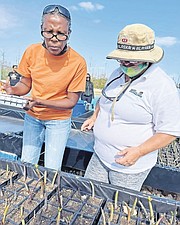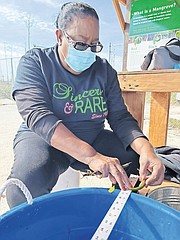By DENISE MAYCOCK
Tribune Freeport Reporter
dmaycock@tribunemedia.net
MANGROVE education and training is underway on Grand Bahama for some 30 participants at the Rand Nature Centre as part of a major Mangrove Restoration Project by Waterkeepers Bahamas and Earthcare Bahamas.
The project - which is aimed at restoring the mangrove forests at Dover Sound - is being funded through a grant from the Bahamas Protected Areas Fund. The goal is to harvest and plant 30,000 mangrove propagules.
The Mangrove Action Project (MAP), a well-known international mangrove conservation group, was brought in to conduct education and proper training for a week, which began on Monday. This is to ensure the successful mangrove restoration.
According to Rashema Ingraham, executive director of Waterkeepers Bahamas, the mangrove restoration project with Earthcare Bahamas will be carried out in a phased approach.
She said: “The first phase of this project is for 12 months, and it is funded under the Bahamas Protected Areas Fund, and that’s where we are looking at the collecting 30,000 (mangrove propagules). But we know that over 40,000 hectares of mangroves were destroyed during Hurricane Dorian. And so, when you think about timeline, this is not a one-year project, this is a phased project that will last for more than five years.”
Ms Ingraham said they have started inviting volunteers, including nine from Pi Upsilon Omega Chapter of Alpha Kappa Alpha Sorority Inc and four from Earthcare, to help with the potting process. She reported that to date they have nearly 3,000 propagules in their nursery at Coral Vita that are being closely monitored.
“Volunteers are helping us to reach our number. On Saturday, we potted an estimated over 300 propagules and prior to potting those we had a little over 2,500 in the nursery,” she said.
She stated that an extended training programme for the Mangrove Restoration Project is being hosted by MAP and will continue until Thursday at the Rand Nature Centre from 9am to 3pm.
“They will help us to think beyond what we are doing for restoration in the country,” she said. “We are pleased that over 30 persons singed up to be a part of that training.”
Ms Ingraham said the out-planting of the mangrove propagules is expected in the Fall of 2022. “So, we will have a minimum of five out-planting exercises where the wider community involvement is anticipated to help us plant as many before the end of the year.”
Alfredo Quarto, co-founder of MAP, said that training and education are important to ensure successful restoration outcome for the long term. He reported that there is a 70 to 80 percent failure rate in restoration attempts.
“The mangrove loss due to the hurricane is something we can’t really stop, but we can try to stop the wrong approach to restoration which is causing failures if plantings are in the wrong places. We are trying to educate people on what the signs are for proper places to plant and methods to restore mangroves so there will be success in the long term.
“We know there is a lot of problems with mangrove loss that people are addressing with wrong approaches, and we are trying to avoid that here, hopefully making it a process which helps restore a successful long-term approach.”
Mr Quarto said MAP was formed in 1992 after seeing the problems with mangrove destruction to the shrimp farming at that time in Thailand, and in other countries. “We formed MAP to address problem of mangrove forest lost. We are actively engaged in mangrove conservation and restoration, and education work. But since then, we expanded it more in a sense of education and restoration now.”
Laura Michie, of MAP, said the four-day training workshop, includes trips into the field so that participants can look at mangroves and biodiversity. “They will be looking at different species of trees and how important all those are; what was lost and how we can restore it; waterflow and the soil; and plant new species. We are enhancing knowledge of participants in mangrove ecology, biology, and a bit of history of mangroves, we are teaching them the right techniques and best practices for mangroves restoration.”
Ms Michie said that 70 percent of GB’s mangroves were destroyed during Hurricane Dorian in 2019. “We know how important mangrove systems are to ecosystems to coastal erosions and fisheries, she said. We are here working with Earthcare and Waterkeepers to help them restore the mangrove forests. This is really important for us, and we worked all over the world with lots of different groups, NGOS, communities, governments, scientists, and lots of groups that want to restore their mangrove forests.”
Gail Woon, founder of Earthcare Bahamas, said the training is an “eye-opening” experience.
“What we learned yesterday was eye opening because some of the techniques we were going to do we are finding out would be bad and relying on one species alone. And finding out if we don’t choose the site, put them in the right spot it is destined to fail. So, this training is so important. By the end of it, we will probably be rethinking our plans going forward. We were going on what we thought was going to work, and we come to find out some of the strategies were not that good. So, it is great that the prospect of this project is much higher now that MAP has come and enlightened us with all of their experience.”
Ms Ingraham said community involvement is also important for the success of a restoration project. Pi Upsilon Omega president Yvonne Pearson said the potting of mangroves was an awesome experience. “I think it is something especially our young people should have an opportunity to participate in. We are more than happy to lend our assistance measuring the mangroves propagules, potting, and watering them for restoration of our mangrove forests,” she said.
Richeena Campbell, first vice president, said: “Service is the heart of our organisation, and what better way to serve our community than to protect our land and country. Target five of our Sorority’s programme is global impact, where we partner with local organizations to have national and international influence. Waterkeepers Bahamas has been monumental in contributing to initiatives to build and rebuild our environment. Pi Upsilon Omega Chapter ladies put their hands on the soil. We delved into protecting our habitat by planting and potting mangroves one by one to create a better land for generations to come,” she said.





Comments
Use the comment form below to begin a discussion about this content.
Sign in to comment
Or login with:
OpenID